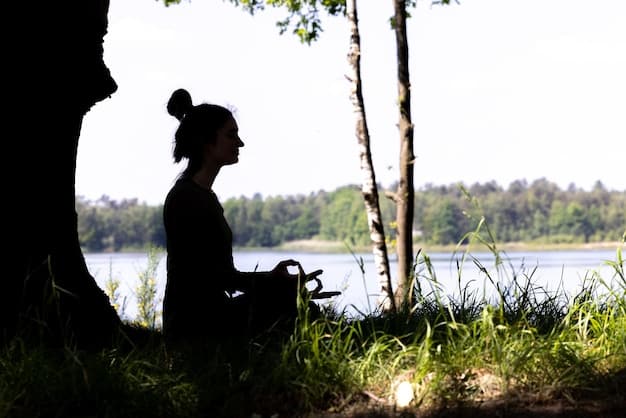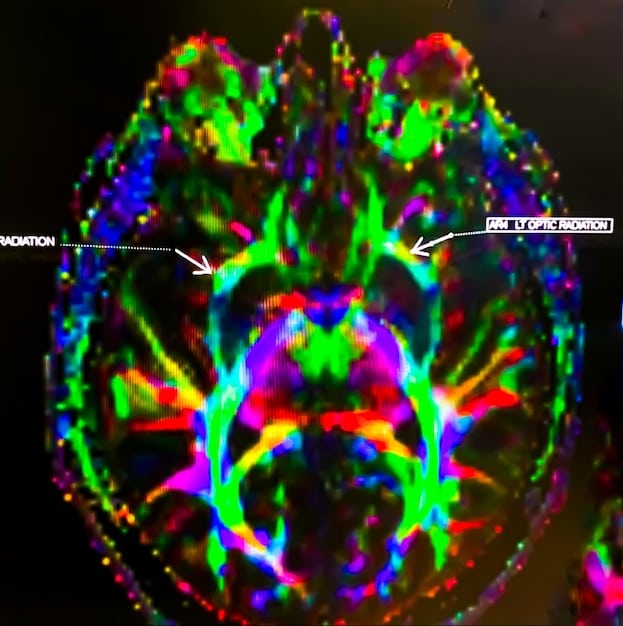Zen & Creativity: Unlock Your Potential with Mindfulness

Zen and creativity intertwine through mindfulness, enhancing focus, reducing stress, and fostering an open mind, thus unlocking your creative potential and inspiring innovative ideas.
Unlocking your creative potential doesn’t always require grand gestures; sometimes, it’s about finding stillness. Discover how Zen and Creativity: How Mindfulness Can Unlock Your Creative Potential and Inspire New Ideas through the practice of mindfulness, transforming your approach to problem-solving and artistic expression.
Understanding Zen and Its Core Principles
Zen, often associated with meditation and mindfulness, provides a unique pathway to enhance creativity. But what exactly is Zen, and how does integrating its principles impact our creative processes?
At its core, Zen is a school of Mahayana Buddhism that emphasizes direct experience of reality through meditation and mindfulness. It encourages individuals to look inward, shedding layers of distraction and discovering innate wisdom.
The Essence of Zen: Simplicity and Awareness
Zen is not about complex doctrines; it’s about simplicity—a state of being fully present in the moment. This simplicity allows for greater awareness, enabling individuals to notice subtle details and connections that might otherwise be missed.
Key Principles of Zen
Several key principles underpin the practice of Zen:
- Mindfulness: Paying attention to the present moment without judgment.
- Zazen (Meditation): A practice of seated meditation aimed at calming the mind.
- Non-Attachment: Letting go of fixed ideas, expectations, and material possessions.
- Acceptance: Embracing reality as it is, without resistance.
These principles collectively create an environment conducive to creativity, fostering a mental space where new ideas can emerge and flourish.
By embracing these concepts, we set the stage for a creative journey deeply rooted in self-awareness and mindfulness. This foundation is crucial for anyone looking to tap into their creative potential.
The Science Behind Mindfulness and Creativity
The connection between mindfulness and creativity isn’t just a philosophical concept; it’s backed by scientific research. Studies in neuroscience and psychology have shed light on how mindfulness practices can enhance creative abilities.
Mindfulness meditation, a cornerstone of Zen practice, has been shown to alter brain structure and function. These changes can positively influence cognitive processes crucial for creativity.

Neuroplasticity and Creative Thinking
Neuroplasticity, the brain’s ability to reorganize itself by forming new neural connections, is enhanced through mindfulness. Regular meditation can increase gray matter in areas associated with attention, emotional regulation, and cognitive flexibility. This flexibility is vital for creative thinking, allowing individuals to shift perspectives and generate novel ideas.
Psychological Benefits of Mindfulness
Beyond brain changes, mindfulness yields significant psychological benefits:
- Reduced Stress: Mindfulness lowers cortisol levels, reducing stress and anxiety. A relaxed mind is more open to creative insights.
- Improved Focus: Regular practice enhances attention span and concentration, improving the ability to delve deeply into creative tasks.
- Enhanced Cognitive Flexibility: Mindfulness promotes a mindset that’s receptive to new information and perspectives, essential for breaking free from conventional thinking.
The marriage of neuroscientific and psychological findings provides a compelling case for mindfulness as a potent tool for unlocking creative potential. It’s a scientifically supported path to fostering a more imaginative and innovative mindset.
Understanding the scientific basis of mindfulness reaffirms its importance in cultivating creativity, providing a solid foundation for integrating these practices into daily life.
Cultivating Mindfulness: Practical Techniques for Creative Growth
While understanding the theory behind mindfulness is helpful, implementing practical techniques can transform the abstract into a tangible benefit for your creative process. Here are some exercises to cultivate mindfulness and foster creative growth.
Incorporating these techniques into your daily routine will help you harness the power of mindfulness to unlock new levels of creativity.
Breathing Exercises
One of the simplest yet most effective ways to practice mindfulness is through focused breathing. Take a few moments each day to sit quietly and pay attention to your breath. Notice the sensation of the air entering and leaving your body.
Mindful Walking
Engage in mindful walking by paying close attention to each step. Feel your feet making contact with the ground, notice the movement of your body, and observe the sights and sounds around you without judgment.
- Focus on Sensations: Pay attention to the physical sensations of walking.
- Stay Present: Avoid getting lost in thought; gently redirect your attention back to your steps.
- Observe Your Surroundings: Notice the details of your environment without getting distracted.
Creative Prompts with Mindfulness
Combine mindfulness with creative prompts to stimulate new ideas. After a brief meditation, ask yourself open-ended questions like “What if…?” or “How can I approach this problem in a completely new way?”
By pairing mindfulness with creative prompts, you encourage a flow of innovative ideas that are grounded in presence and awareness. This approach is invaluable for breaking through creative blocks and fostering originality.
Through regular practice, these techniques will help you cultivate a mindful approach to creativity, enriching your ability to generate novel ideas and solutions.
Overcoming Creative Blocks with Zen Principles
Creative blocks are a common frustration for artists, writers, and innovators alike. Zen principles offer valuable strategies for overcoming these obstacles by shifting our perspective and fostering a more open, accepting mindset.
By applying Zen principles, you can transform creative blocks into opportunities for growth and deeper understanding.

Letting Go of Expectations
Often, creative blocks stem from rigid expectations and self-criticism. Zen teaches non-attachment, encouraging us to let go of preconceived notions about what our work should be. This freedom allows creativity to flow more naturally.
Embracing the Present Moment
Worrying about past failures or future outcomes can hinder creativity. Mindfulness encourages us to focus on the present moment, allowing us to approach each task with a fresh perspective and renewed energy.
- Practice Present Moment Awareness: Regularly bring your attention back to the task at hand.
- Accept Imperfection: Recognize that mistakes are a natural part of the creative process.
- Avoid Self-Judgment: Approach your work with compassion and curiosity rather than criticism.
This embrace of the present moment can unlock new insights and help you approach challenges with a clear, focused mind.
By releasing expectations and focusing on the immediate task, you create a mental and emotional space that fosters creativity and allows you to move past creative blocks.
Integrating Zen into Daily Creative Practice
Integrating Zen principles into your daily creative practice doesn’t require a complete overhaul; it’s about weaving small, intentional moments of mindfulness into your routine. These practices can significantly amplify your creative output and overall well-being.
Incorporating these practices into your daily routine will create a sustainable foundation for enhanced creativity and mindfulness.
Morning Meditation
Start your day with a brief meditation session. Even five minutes of quiet reflection can set a positive tone for the day, clearing your mind and preparing you for creative tasks.
Mindful Breaks
Take short, mindful breaks throughout the day. Step away from your work, focus on your breath, and observe your surroundings. This can help reduce mental fatigue and spark new ideas.
- Set a Timer: Schedule short breaks every hour.
- Engage Your Senses: Pay attention to the sights, sounds, and smells around you.
- Stretch and Move: Incorporate gentle stretches to release tension in your body.
Reflective Journaling
End your day with reflective journaling. Write down your thoughts, feelings, and insights from the day. This practice can help you process experiences and uncover hidden patterns that fuel your creativity.
By integrating these simple Zen practices into your daily life, you create a supportive environment for your creative spirit to flourish.
Transforming routine moments into opportunities for mindful reflection not only enhances creativity but also cultivates a deeper sense of inner peace and balance.
Real-Life Examples: Zen and Creativity in Action
The impact of Zen principles on creativity can be seen across various fields, from art and literature to business and technology. Many successful individuals attribute their innovative ideas and problem-solving skills to the practice of mindfulness.
Exploring these examples illustrates the far-reaching benefits of integrating Zen principles into everyday life.
Steve Jobs and Apple’s Design Philosophy
Steve Jobs, the co-founder of Apple, was a dedicated practitioner of Zen Buddhism. His commitment to simplicity, minimalism, and user-centered design reflects the core values of Zen. Apple’s products are known for their clean lines, intuitive interfaces, and focus on essential features, all of which can be traced back to Jobs’s Zen practice.
Creative Artists and Mindfulness
Numerous artists have embraced mindfulness to enhance their creative process. By practicing meditation and cultivating a sense of presence, they find inspiration in the subtle details of their surroundings and approach their work with greater focus and clarity.
- Musicians: Many musicians use mindfulness to improve their focus during performances and connect more deeply with their audience.
- Writers: Writers often turn to mindfulness to overcome writer’s block and tap into their inner voice.
- Visual Artists: Visual artists use mindfulness to enhance their observation skills and capture the essence of their subjects.
These artists demonstrate how mindfulness can sharpen focus, reduce distractions, and unlock new levels of creativity.
These real-life examples highlight the profound impact of Zen principles on creativity, demonstrating how mindfulness can transform ideas and approaches across various disciplines.
| Key Concept | Brief Description |
|---|---|
| 🧘 Mindfulness | Being fully present in the moment to enhance awareness. |
| 🧠 Neuroplasticity | Brain’s ability to form new neural connections, boosting cognitive flexibility. |
| 🚫 Non-Attachment | Letting go of fixed ideas and expectations to unlock creative flow. |
| 🎨 Creative Prompts | Using open-ended questions to stimulate innovative thinking. |
Zen and Creativity: FAQs
▼
Zen enhances creativity by fostering mindfulness, reducing stress, and promoting an open mindset. By being present, one can observe nuances and explore new ideas without constraints.
▼
Meditation is central to Zen, helping to calm the mind and improve focus. This allows for more profound insights and innovative thinking, reducing mental clutter and distractions.
▼
Yes, anyone can benefit from Zen practices. Whether you’re an artist, writer, or professional, mindfulness and Zen principles can unlock mental clarity and innovative approaches.
▼
Start with simple practices like daily meditation, mindful breaks, and reflective journaling. Gradually incorporate these techniques to build a routine fostering creativity and mindfulness.
▼
It’s normal to struggle initially. Start with short sessions and use guided meditations. The key is persistence and gentle redirection when your mind wanders, enhancing focus gradually.
Conclusion
Embracing Zen and mindfulness can profoundly transform your creative process, fostering innovation, reducing stress, and unlocking your full potential. By integrating these principles into your daily life, you’ll discover new depths of creativity and a greater sense of inner peace.





